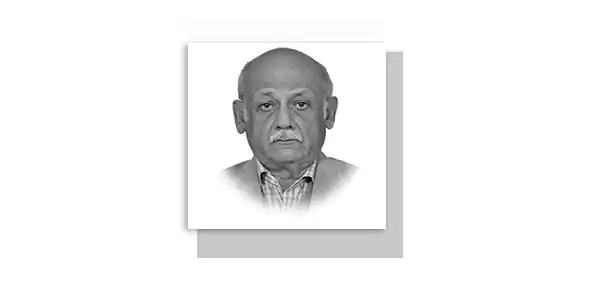AFTER the gory and tumultuous events of a very painful civil war Bangladesh appeared on the map of the world on 16 th December 1971.
This new member of the community of nations was recognised by Pakistan after the Islamic Summit Conference of Lahore in 1974.
Since recognition the relations between the two countries have been bitter sweet with Bangladesh demanding an unconditional apology from Pakistan about the happenings of 1971 and Pakistan unwilling to tender any such apology.
Diplomatic and trade relations have been established since 1974 and there has been a gradual improvement in trade between the two.
Last year in August the long tyrannical rule of Sheikh Hasina ended after 15 years of almost autocratic administra-tion and oppressive rule.
Sheikh Hasina the daughter of the father of the nation Sheikh Mujib Ur Rahman was a very close ally and friend of India in fact a staunch puppet of the Modi regime in India.
The relationship between the two countries has been a roller coaster ride but it was never as low as it was during the reign of Sheikh Hasina in Bangla-desh.
During this time the Indian intelligence agencies were successful in infiltrating the bureaucracy and the armed forces of Bangladesh.
In fact most important decisions of the Bangladesh Govt. had to be approved by New Delhi and Bangladesh officials were scared of inter acting freely with Pakistani diplomats and Govt. officials.
Hasina’s hurried and inglorious departure from Dhaka has resulted in a very dramatic change in the political landscape of the region and while Sheikh Hasina remains in exile in India the strained relationship between Pakistan and Bangladesh has im-proved dramatically with great hopes for the future.
Rapid and pleasant changes have been seen in the relationship of the two countries, The Bangladeshi head of Govt.
has met with his Pakistani counterpart twice during the last six months while he has yet to have a formal meeting with the Indian PM and there has been a flurry of activities launched by the Pakistani diplomats in Dhaka resulting in cultural exchanges such as the performance of the Pakistani Qawal the legendary Rahat Fateh Ali
Khan to packed houses in Dhaka and the arrival of two cargo ships from Pakistan in the portof Chittagong the first such initiative since the birth of Bangladesh.
The new Govt. Bangladesh led by Dr.Mohd. Younus has removed all restrictions on our diplomats has eased via restrictions and there has been a rush of visits between the two countries and a beginning has been made in direct trade and a military delegation led by an army general has visited Pakistan something that was unthinkable during the regime of Hasina Sheikh.
After along period of 15 years Foreign secretary level of talks were held between the two countries and the Pakistani Foreign Secretary Amina Baloch met the chief executive and the foreign policy advisor of Bangladesh all these meetings were held in a very cordial and constructive manner.
During these meetings the fly in the ointment was the demand by the Bangladeshi Foreign secretary for a public apology for the events of 1971 and a payment of 4.3 billion dollars as its share of the pre 1971 assets, This demand by the Bangladesh Secretary Jashim Uddin left a bad taste in the mouth at this time when relations between the two countries were improving rapidly with a promise of great improvements in future.
The statement by the foreign secretary of Bangladesh was played up by great fanfare by the Indian mediawhich was of course expected but the Pakistani side ignored the statement insisting that the talks were in the interest of both countries and were held in a very amicable and friendly manner.
According to the Pakistani side the Bangladeshi demands were ages old but the other side is well aware of our stance that the 1971 events were in the past and a forgotten issue.
Pakistan has so far not tendered any apology and is not likely to do so in future but the process of negotiation will continue and ties between the two countries will definitely improve greatly in future.
Since the political transition last year, trade has become a key focus of development between the two countries.
However, bilateral trade remains imbalanced, favoring Pakistan.
Notably, between August and December 2024, bilateral trade increased by an estimated 27 per cent, with both nations exploring ways to diversify trade into areas such as construction materials, food products, pharmaceuticals, and information technology, and Pakistan aiming to increase annual trade with Bangladesh to more than four times the current level within a year.
The apex trade bodies of both countries signed a memorandum of understanding on 13 January to establish a joint business council.
For the last seven years direct flights between Pakistan and Bangladesh have been suspended and the issue of visas to Pakistani visitors has become extremely tedious and difficult because of the numerous security checks by various security agencies making travel between the two countries almost impossible.
As of now the Bangladesh Govt.
has removed all impediments and the Pakistani side has responded by doing away with the visa fees and the requirements of security clearance for Bangladeshi visa applicants.
In a further gesture of goodwill the govt.
of Pakistan has offered fully funded scholarships in Pakistani universities fr Bangladeshi stu-dents.
One notable development has been Bangladesh’s interest in acquiring JF-17 Thunder fighter jets from Pakistan.
These jets, jointly developed by Pakistan and China, align with Bangladesh’s ongoing modernization efforts under its “Forces Goal 2030” program, aimed at upgrading the country’s military assets.
But such a defense relationship is likely to impact South Asian geopolitics, particularly given India’s historical influence over Bangladesh’s defence and foreign policy.
The closer ties between Dhaka and Islamabad are already a concern to India, which views Pakistan as a long-standing rival.
—The writer is Professor of History, based in Islamabad.


















